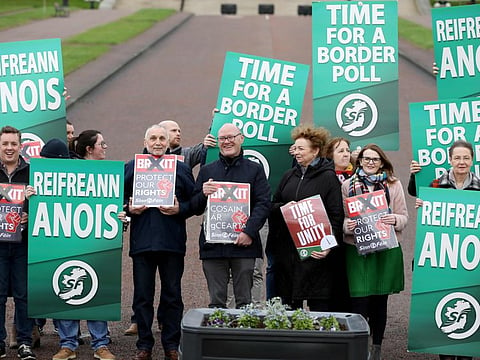Sinn Fein’s day is coming
For the first time, it is led by leaders not party to Northern Ireland terror campaign

Let’s start this off with a question: How can you tell if you phone is bugged? And no, it has nothing to do with clicks or sounds when you’re connected.
The answer is surprisingly simple. If you suspect your phone is bugged, don’t pay the telephone bill — your service won’t be cut off, the presumed logic being that if someone wants to hear what you have to say, they will want to keep listening.
The phone lines to Sinn Fein were never cut off during all of the years of ‘The Troubles’ in Northern Ireland. The truth in this story stems from the darkest days and decades, a time when the world’s focus was regularly on the little corner of Ireland governed by Britain. It was Europe’s bloodiest and longest-lasting terror campaign, a time when bombers plied their murderous trade in pubs in London and Birmingham, struck at Harrods and Hyde Park, Canary Wharf and Warrington.
Sinn Fein is still in the propaganda business, and it is a pity Irish voters don’t remember the lessons of history.Mick O’Reilly, Foreign Correspondent
And back in Northern Ireland, there was murders and mayhem, bombings and bullets, kneecapping punishment shootings, judicial killings by the British military, massacres committed by paramilitaries, paratroopers and paralytic psychopaths.
And for all of the murder and terror wrought by the Irish Republican Army up to the signing of the Good Friday Accord in 1998, Sinn Fein was the political voice who excused those Republican wrongs. When innocent victims died in roadside bombings meant for British troops or local police and security forces, Sinn Fein mumbled words of sorrow and excused the actions as necessary to remove the British presence from Northern Ireland.
Bloody history
When shoppers and tourists in London were blown to bits, maimed and scarred by bombs that contained nails, Sinn Fein spoke about the need for the Irish people’s struggles to be brought to the mainland of Britain.
And on the southern side of the border, when IRA members were brought before the Special Criminal Court in the Republic of Ireland to face charges of organised terror — murdering unarmed policemen, importing vast arsenals of guns and explosives, making bombs, robbing banks, plotting killings and trying to destabilise the workings of a state that tried to operate as normally as possible with such elements at work within its borders and just across the hedgerows into Northern Ireland — Sinn Fein railed against the injustice of it all.
While the masked men of the IRA fought the military war to a stalemate and the ultimate position that they knew they could never win with the bullet alone, Sinn Fein was fighting the propaganda war, believing that it could win at the ballot box.
Thankfully, those dark days officially ended more than two decades ago now. Not so thankful are the families and friends of the 3,600 who died then and the 36,000 more who carry the physical and mental scars for the rest of their lives.
And today, Sinn Fein are largely silent on those times.
Also Read: Peace must endure in Northern Ireland
Tomorrow, voters in the Irish Republic head to the polls in a general election. Opinion polls put Sinn Fein support at around 25 per cent — ahead of the two main political parties that between them have formed every government since the foundation of the modern state back a century ago. Fianna Fail stands at 23 per cent, Leo Varadkar’s Fine Gael struggling to hold on to 20 per cent support. Both Micheal Martin, the Fianna Fail leader, and Varadkar have said they will not consider forming a government with Sinn Fein as part of a coalition, there is a belief that the party’s time is close at hand.
Sinn Fein shares power in Northern Ireland now that the administration there is back up and running after a three-year standoff with the Democratic Unionist party over language rights.
How soon before it plays a part too in the government of the Republic too?
For the first time, Sinn Fein is led by leaders who have not been party to the terror campaign in Northern Ireland. The late Martin McGuinness, the deputy first minister in Northern Ireland, openly admitted his part in leading the Derry brigade of the IRA. Former Sinn Fein President Gerry Adams, who has recently retired, was active in Belfast, is listed in British intelligence reports as the terrorists’ quartermaster, knew where the guns and bullets were and why they were moved, and sat on the Army Council of the IRA. He hasn’t the cahones to admit as much despite the testimony of many of his former comrades in arms.
One of its policies now is to campaign for the abolition of the Special Criminal Court — an institution now used to target hardened and vicious drug gangs who have engaged in a concerted campaign of terror that was certainly inspired by the activities of the hardmen of the IRA campaign.
And it has railed against the success of both Fine Gael and Fianna Fail in building a modern, democratic state with all of its faults and failings. Yes, Sinn Fein is still in the propaganda business, and it is a pity Irish voters don’t remember the lessons of history.



